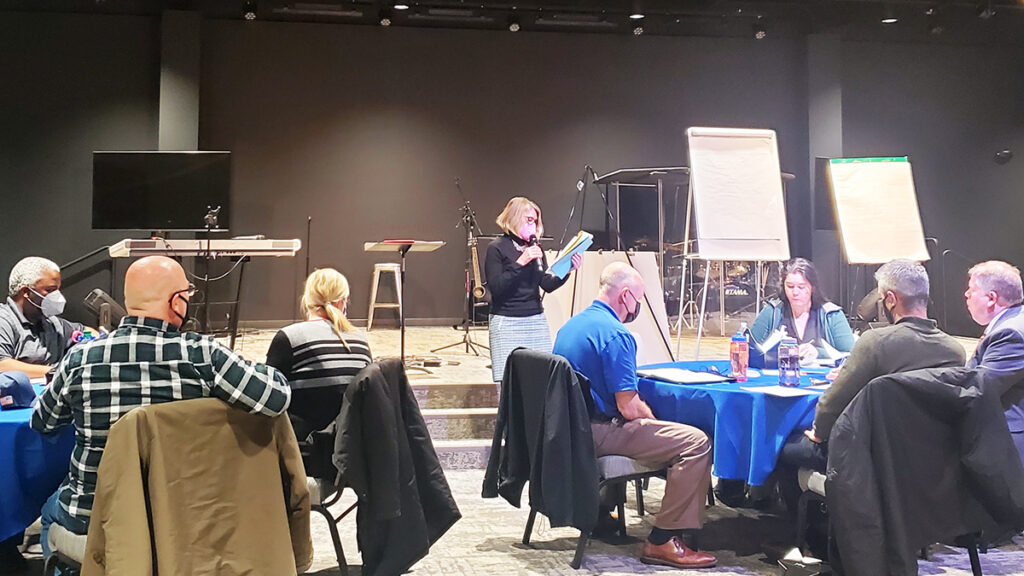
“This is a violation,” said Urbana, Illinois City Clerk Phyllis Clark when she became aware that a meeting of the Urbana City Council on Tuesday evening was being audio-recorded. Urbana City Council members, staff, and even Urbana Police officers then began disabling and removing recording equipment which Check CU had brought to the meeting.
The meeting, referred to as a “City Council Strategic Goal-Setting Session”, was attended by approximately thirty City officials and staff members and was, by all appearances, designed to evade public oversight.
Tuesday’s meeting was not held virtually or in the City Building, but at Stone Creek Church, which is at the southern edge of the City. The location and earlier 5:30pm start time made the meeting far less accessible to many Urbana residents. The physical gathering was notable since, the evening prior, the City Council held a Committee of the Whole meeting on Zoom, declaring that due to COVID-19, “it has been determined that an in-person public meeting is not prudent or safe at this time.” It is unclear how the safety concerns of the pandemic changed so drastically in less than 24 hours.
Tuesday’s meeting appeared on the City calendar just days prior to the meeting date, unlike other City Council meetings, which are posted on the City website weeks or months in advance. The City did not broadcast the meeting and there was no way to attend or watch the meeting remotely. Residents could only observe the meeting in-person and the City has not made any recording of the meeting available to the public.
The meeting layout was such that the Mayor, City Council members, and other City officials were seated at round tables near the stage of the assembly hall, and public seating was placed further back.
At the beginning of the meeting, the Mayor and other public officials used a microphone to speak. However, after about fifteen minutes, the speakers stopped using a microphone and the meeting broke into discussions at the round tables near the stage. Statements by the Mayor and City Council members were inaudible from the public seating area, and this persisted for about one third of the meeting.
In addition to the public being unable to hear a large portion of the meeting, Check CU’s camera equipment also could not discern the commentary of the Mayor and Council. Check CU placed several audio receivers on the tables near the stage to ameliorate the deficiency.
Ward 1 Alderperson Maryalice Wu immediately complained to the City Clerk that the meeting was being audio recorded.
City Clerk Phyllis Clark walked up to the microphone and announced that audio recording in the vicinity of the Mayor, Council and City officials was “a violation”. Clark said that the recording devices had to be removed.
Ward 5 Alderperson Chaundra Bishop removed an audio device from her table, then later disabled it.
Ward 3 Alderperson Shirese Hursey asked Check CU to turn off the recording equipment. When her request was not satisfied, she disabled the equipment herself.
Deputy Chief Richard Surles became upset and yelled when an audio equipment was placed near him, and it was disabled multiple times.
Community Development Services Director Sheila Dodd repeatedly grabbed and attempted to disable an audio device that was placed near her.
When asked about Open Meetings Act compliance, City Administrator Carol Mitten argued that audio recording was disruptive to the meeting, and that many of the public officials felt uncomfortable speaking if the session was being recorded. When Mitten was informed that the public could not hear what their City officials were saying, Mitten yelled, “well, they’re saying god damn nothing right now!”
Carol Mitten found the recording to be so disruptive that she suggested City officials should consider simply leaving the Council meeting. Her statement appeared to be a passive admission that the City could not prevent audio recording at a public meeting, but City officials continued to actively disable the audio recording equipment.
Each of these City officials regularly participate in public meetings that are fully recorded. For the vast majority of their recent public meetings, the same officials sit directly in front of a camera and microphone for the duration of the meeting. State law requires the City to record their Zoom meetings, and requires them to “allow any interested member of the public access to contemporaneously hear all discussion, testimony, and roll call votes”. It is nothing short of bizarre that dozens of City officials suddenly felt that a City Council meeting should not be recorded.
The Illinois Open Meetings Act (OMA) assures the right of the public and the press to attend and record meetings of public bodies. All meetings must be open and accessible to the public, with the exception of a few rare instances where public bodies can go into closed session.
Every member of a public body in Illinois is required to complete OMA training within 30 days of taking office. Violations of the OMA are crimes, but State’s Attorneys almost never prosecute them.
The only public official who voiced a concern about the Open Meetings Act was Ward 6 Alderperson Grace Wilken. Wilken spoke up after Clark’s declaration, saying that she thought the public had the right to record meetings. Clark responded that the public being allowed to hear everything is “not the way it should be. Get the minutes, and get the information the right way.”
Meeting minutes are not nearly as accurate and as readily available as a verbatim recording of a meeting. The Illinois Attorney General is currently investigating the City of Urbana for failing to post their meeting minutes for several months. Check CU has also discovered instances of inaccurate minutes, such as Clerk Phyllis Clark fabricating a council vote.
Check CU asked Mayor Diane Marlin twice for her perspective on Tuesday night’s events, and she refused to comment both times. Last year, Mayor Marlin and the City Council were cited for multiple OMA violations by the Illinois Attorney General, and also paid to settle a related lawsuit.
The following Urbana Public Officials actively participated in prohibiting recording of the meeting, or stayed silent while their peers removed and disabled recording equipment:
Mayor Diane Marlin
City Clerk Phyllis Clark
Ward 1 Alderperson Maryalice Wu
Ward 2 Alderperson Christopher Evans
Ward 3 Alderperson Shirese Hursey
Ward 5 Alderperson Chaundra Bishop
Ward 7 Alderperson James Quisenberry
City Administrator Carol Mitten
Police Chief Bryant Seraphin
Deputy Police Chief Richard Surles
Sergeant Michael Cervantes
Fire Chief Charles Lauss
Deputy Fire Chief Kent Demond Dade
Human Rights and Equity Officer Carla Boyd
Community Engagement Coordinator Lemond Peppers
Community Development Services Director Sheila Dodd
Executive Assistant to the Mayor and City Administrator Kate Brickman
Deputy City Clerk Darcy Sandefur
IT Director Sanford Hess
Management Analyst William Kolschowsky
Prior Ward 6 Alderman Dean Hazen (current Police Chief for Richland Community College)
Urbana Police Department Crime Analyst Melissa Hendrian
(list is incomplete – limited to individuals that could be identified)
Check CU has also found that the Urbana City Council has held similar off-site meetings on December 2nd, December 3rd, December 15th, and January 6th. No recordings of these meetings appear to have been made available to the public.

This behavior is nothing short of what we have been subject to during the last Presidential Administration. It is as if they took the page right out of their play book. I was shocked to see that Phyllis Clark took part in this illegal action. We continue to see this as 1/6 Hearings expose the Secrete Service dleleting text messages. After reading of multiple violations these people should be dismissed. ALL of them.
Must be Democrats !!